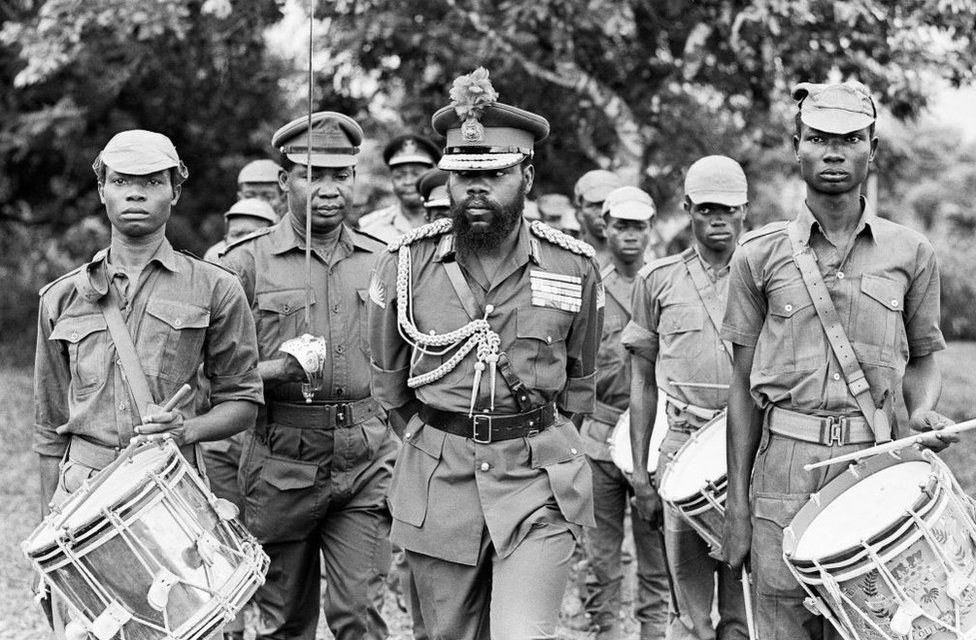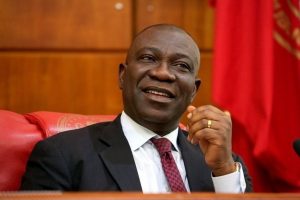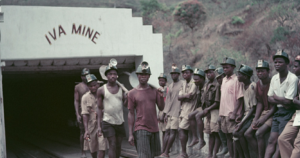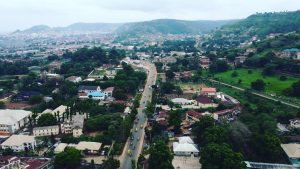
Enugu, the former capital of the breakaway Republic of Biafra, was the focal point of a military battle between Nigerian and Biafran forces in September and October 1967 during the Nigerian Civil War. Shortly after the conflict started, the seizure of Enugu was given top priority by Nigerian federal forces, but their progress was halted near Nsukka. In August, Biafran leader Odumegwu Ojukwu launched an invasion of Nigeria’s Mid-Western Region in an effort to divert attention away from the Nigerian Army. However, the offensive was stopped.
With seven battalions of the 1st Division, Lieutenant Colonel Theophilus Danjuma prepared to move on Enugu while commanding the Nigerian soldiers in the Nsukka front. One brigade under the command of Colonel Alexander Madiebo and unarmed citizens who had been drafted into service guarded Enugu. To make it more difficult for the Biafrans to block them along main highways as had previously happened, Danjuma chose to launch an offensive with his soldiers dispersed across a broad front.
From Nsukka, the Nigerians started moving forward on September 12. In an effort to slow them down, Biafran forces launched counterattacks and cut down trees, but within a few weeks, Nigerian soldiers had arrived at Milliken Hill and had gathered their men there. On September 26, federal artillery started shelling Enugu as the Nigerian Air Force carried out operations. Ojukwu promised not to leave the city, but on October 3 the Biafrans started to leave.
The next day, Nigerian forces launched an invasion, taking control of the city with little opposition and just escaping Ojukwu. Many Nigerians believed that the seizure of Enugu would persuade the traditional Igbo elite to abandon their support for secession. Although its capture did undermine the Biafran war effort, Ojukwu moved his government to Umuahia, where its propaganda masked the city’s loss. As a result, the majority of Biafrans were unaware of Enugu’s capture until the war’s conclusion.
The cause of the war
Ethnic tensions in Nigeria substantially increased in the late 1960s. Many Igbo people in eastern Nigeria were afraid of oppression and prejudice from other ethnic groups there. Easterners living in the northern part of the country were slaughtered by Nigerian Armed Forces soldiers in September 1966, which led to the exodus of thousands more people to the eastern city of Enugu. Nigeria’s Eastern Region announced on May 30, 1967, that it was leaving the union to form the independent state of Biafra.
The capital of Biafra was Enugu, and Lieutenant Colonel Odumegwu Ojukwu, a former military governor of the Eastern Region, served as its head of state. The Nigerian government intended to put an end to the secession in four stages over the course of a month. The protection of Enugu and Nsukka was their first main objective. The Nigerian Civil War began on July 6 when Nigerian federal troops launched their operation to retake Biafra. Federal leaders first announced that Enugu would be taken by their forces “in 48 hours,” but the combat quickly came to a standstill, with fierce fighting occurring near Nsukka.
Nearly 140,000 people, predominantly Christian Igbos, called Enugu home at the outbreak of the conflict. As soon as fighting began, people began to leave the city in search of safety farther into Biafran territory. Foreign nationals were urged to leave Biafra by their own governments, and by the end of July just approximately 50 people were left in Enugu—mostly journalists, arms dealers, diplomats, and traders. Ojukwu commanded an invasion of Nigeria’s Mid-Western Region in an effort to divert government attention away from Enugu. After starting their onslaught in August, Biafran forces advanced steadily, taking Benin City and getting as close as 100 miles to Lagos before being stopped at Ore.
Colonel Alexander Madiebo, the newly appointed commander of the Biafran Army, was given the duty of defending Enugu, but the unit was worn out from prior battles and unable to bring in reinforcements. Ojukwu gave the order for all the able-bodied men to be mobilized in an effort to strengthen the city’s defense.
On September 12, Nigerian military in the Nsukka region started making serious progress toward Enugu. The soldiers maintained constant communication with one another to maintain a straight line of advance while carrying largely small guns and a few anti-tank weapons. Nigerian troops on the main road were subjected to heavy fire from Biafran forces as they counterattacked, but the rebels guarding the side roads were taken by surprise and withdrew right away. Biafran troops dug craters and felled trees to block roads as they withdrew, slowing the offensive.
On October 1, shortly after midnight, Ojukwu made a radio statement in which he vowed not to leave Enugu. Danjuma used an attack strategy for the city that he had initially developed as part of a promotion examination some years earlier as the Biafrans started fleeing Enugu on October 3. Federal air and ground forces attacked the city on October 4. When the federal troops attacked the Biafran State House, Ojukwu was sound asleep inside. When he awoke, he discovered that his guards and advisers had vanished and that the building was surrounded by federal troops.
The Biafrans lost a substantial amount of supplies and equipment with the surrender of Enugu. The Ministry of Information became disorganized due to the forced relocation of personnel, and the federal force’s success called into question earlier Biafran claims that the Nigerian state could not withstand a protracted war. It also temporarily undermined their propaganda efforts. In a broadcast on October 23, 1967, the Biafran official radio stated that Ojukwu had vowed to keep opposing the federal government and had attributed military reverses to subversive activities.


